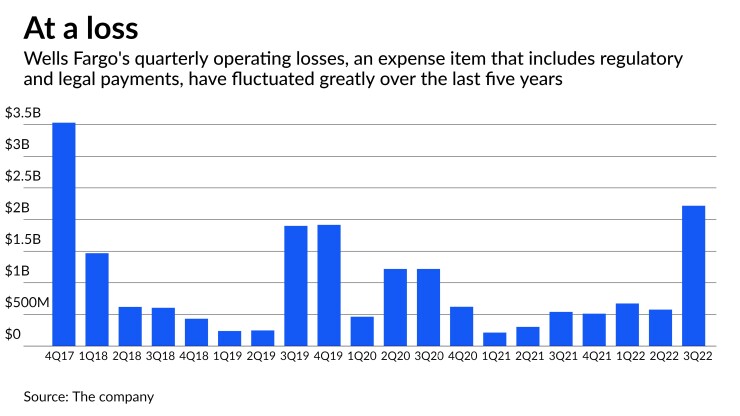If Wells Fargo were a regular bank — not one that intermittently takes large hits tied to regulatory troubles — its third-quarter earnings report would have ticked many boxes.
The San Francisco-based megabank grew its loans, collected more interest and made progress in cutting expenses, even as its loan book remained healthy.
But the regulatory woes that have long plagued the company once again clouded its earnings. Wells recorded $2.2 billion in operating losses — the line item where it counts expenses from lawsuits, regulatory penalties and customer restitution. And CEO Charlie Scharf said it's "highly likely" that the bank may record more expenses in future quarters that "could be significant."

Analysts have mostly given up on asking Scharf to predict when Wells Fargo will get out of the penalty box. And they struggle to make precise forecasts due to the irregular nature of the bank's regulatory expenses.
"They're really impossible to predict, not only in frequency, but in magnitude," said Kyle Sanders, senior equity research analyst at Edward Jones.
The bank's operating losses in the third quarter were higher than in any quarter since late 2017.
Scharf, who joined Wells in October 2019, said the bank's "top priority remains strengthening" its risk and control framework and "addressing open historical issues and issues that are identified" as that work moves forward.
The bank continues to operate under a $1.9 trillion asset cap the Federal Reserve imposed in 2018, and last year the Office of the Comptroller of the Currency
Scharf reiterated Friday that the bank remains "at risk of setbacks" as it works to address regulators' concerns.
"We don't like the charge for sure," he said during a call with analysts. "But it is just the reality of the position that we're in to get these things behind us. … This isn't the end of it. But we would like to move as quickly as we can on everything that's remaining to get behind us."
Scharf also had some advice for analysts on how they should factor Wells' elevated regulatory expenses into their forecasts: "I personally wouldn't model them coming down until we actually see them coming down," he said.
The accrual made for a "messy" quarter, according to Scott Siefers, a Piper Sandler analyst. Earnings per share of 85 cents were far below the $1.09 per share consensus, but Siefers calculated a core EPS of $1.31 after removing the regulatory-related expenses.
"We're sensitive to excluding these costs, since they have been so high and so many for so long," Siefers wrote, adding that he hopes the quarter "reflected a 'kitchen sink'" approach that will lead to reduced expenses going forward.
Investors looked past the regulatory-related hit and focused on the mostly positive news from the earnings report. The bank's stock price was up to $43.58 in mid-afternoon trading, a 2.83% jump.
The market's reaction on Friday offered a stark contrast with investors' past disappointment over any regulatory troubles, Sanders said. He credited Scharf for giving investors confidence that the bank's management team will "at some point" get past those issues.
"People used to get frustrated by them, but now I think a lot of investors are just shrugging them off," Sanders said of the regulatory expenses.
The specific drivers of the $2.2 billion charge were unclear. Scharf said most of the operating losses were due to "litigation, customer remediation, and regulatory matters primarily related to a variety of historical matters."
John McDonald, an analyst at Autonomous Research, asked Scharf on the call for clarity on whether the large charge reflects a reassessment of future payments Wells will have to make, or whether the bank "got hit with some stuff that you didn't expect and you've already paid up."
Scharf noted that accounting rules dictate that companies accrue for events when they become probable and can be reasonably estimated.
"We've tried to be very, very transparent … we do have things that will be lumpy, that could be significant," Scharf said. "It's in our best interest to get as much behind us as quickly as we possibly can."





